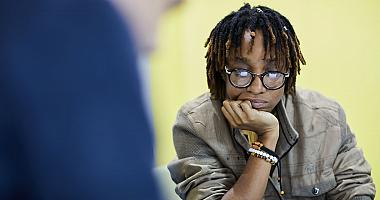MPhil/PhD Creative Writing
Content navigation menu
Why study MPhil/PhD Creative Writing at Goldsmiths
The inter-relationship between theory, scholarship and the creative process is key to the Goldsmiths MPhil/PhD Creative Writing.
- Combine your own creative writing – whether poetry, fiction or life writing – with research into the genre or area of literature in which you are working, to gain insight into its history and development, and to engage with relevant contemporary debates. This might be genre in the more traditional sense, for example satire, fictional autobiography, verse drama, or particular traditions to which you feel your work relates, for example projective verse, postmodernist fiction, or Caribbean poetics.
- Literary and Creative Studies at Goldsmiths comprises leading scholars and creative writers.
- Beyond this original research into the literature, cultures and languages of the past and present, a substantial number of our academic staff produce the literature of the future, as creative writers.
- Research students benefit directly from this intellectual and creative culture, as well as from proximity to the British Library and the University of London Library, and from other research resources, such as the University of London's School of Advanced Studies and the specialised seminars and training opportunities provided there, to which our academic staff also contribute.
- We are also home to the Goldsmiths Prize, established in 2013 to celebrate the qualities of creative daring associated with the College.
Contact
If you have specific questions about the degree, contact Stephen Knight.
Length
3-4 years full-time or 4-6 years part-time
Entry requirements
You should normally hold a first or upper-second class BA Honours degree and have either a good MA in Creative Writing or a track record of relevant publications with a reputable company.
Fees
Home - full-time: £TBC
Home - part-time: £TBC
International - full-time: £21000
School
Subject
Goldsmiths creative writing students and alumni
Former and current PhD students include the following published writers and poets:

- Booker Prize winning Bernardine Evaristo, whose Jerwood Fiction Uncovered-winning book 'Mr Loverman' was written, in part, at Goldsmiths
- Season Butler
- Tom Lee
- Benjamin Woolley
- Linda Buckley-Archer
- Wendy Jones
- Justin Hill
- Sophie Ward
- Francis Gilbert
- Emma Darwin
- Virginia Peters
- Thomas Sykes
- Aoife Mannix
- Katrina Naomi
- Kate Miller (winner of the Seamus Heaney Centre for Poetry Prize)
- Kathryn Maris
- Jack Underwood
- Abigail Parry
- Matthew Gregory
- Jenny Lewis
Entry requirements
You should normally hold a first or upper-second class BA Honours degree and have either a good MA in Creative Writing or a track record of relevant publications with a reputable company.
International qualifications
We accept a wide range of international qualifications. Find out more about the qualifications we accept from around the world.
If English isn’t your first language, you will need an IELTS score (or equivalent English language qualification) of 7.0 with a 7.0 in writing and no element lower than 6.5 to study this programme. If you need assistance with your English language, we offer a range of courses that can help prepare you for postgraduate-level study.
How to apply
Apply directly to Goldsmiths using our online application system.
If you are interested in applying to the PhD Creative Writing programme, please send your academic CV, along with a sample of your writing (approx 3,000 words) to graduateschool@gold.ac.uk. These will then be seen by the programme convenor, who will be able to advise on supervisor availability in Literary and Creative Studies, and whether you should submit a formal application.
The actual topic of your research has to be agreed with your proposed supervisor, who will be a member of staff active in your general field of research, before you start at Goldsmiths. The choice of topic may be influenced by the current research being undertaken in Literary and Creative Studies at Goldsmiths or the requirements of an external funding body.
For your application you'll need to have:
- Details of your education history, including the dates of all exams/assessments
- The email address of your referee who we can request a reference from, or alternatively an electronic copy of your academic reference
- Contact details of a second referee
- A personal statement – this can either be uploaded as a Word Document or PDF, or completed online. Please see our guidance on writing a postgraduate statement
- If available, an electronic copy of your educational transcript (this is particularly important if you have studied outside of the UK, but isn’t mandatory)
- Details of your research proposal
You'll be able to save your progress at any point and return to your application by logging in using your username/email and password.
If you wish to study on a part-time basis, you should also indicate how many hours a week you intend to devote to research, whether this will be at evenings or weekends, and for how many hours each day.
Research proposals
Along with your application and academic reference, you should also upload a research proposal at the point of application.
This should be in the form of a statement of the proposed area of research and should include:
- Delineation of the research topic
- Why it has been chosen
- An initial hypothesis (if applicable)
- A brief list of major secondary sources
How detailed a research proposal are we looking for on the application form?
Obviously what you put on the form and exactly what you end up researching may be rather different, but in order to judge whether or not to offer you a place, we need to know whether you have the broad outlines of a viable project. This means:
- A project that is both worthwhile and interesting, but not over-ambitious
- A project that can realistically be achieved within the confines of PhD on a full-time (4 years typically) or part-time (six years maximum) basis
- We need to be sure that you have thought about it carefully and are fully committed to the research
- We need to be sure that you understand what is involved in doing a PhD
- Your research proposal should give us enough information to be able to interview you (if you are in the UK) or reach a decision as to whether to admit you if you are not based in the UK
When to apply
We accept applications from October for students wanting to start the following September.
We encourage you to complete your application as early as possible, even if you haven't finished your current programme of study. It's very common to be offered a place conditional on you achieving a particular qualification.
If you're applying for external funding from one of the Research Councils, make sure you submit your application by the deadline they've specified.
Selection process
If your degree is in an unrelated field, you may be considered subject to a qualifying interview and/or submission of sample essays.
Fees and funding
Annual tuition fees
These are the PG fees for students starting their programme in the 2025/2026 academic year.
- Home - full-time: £TBC
- Home - part-time: £TBC
- International - full-time: £21000
If your fees are not listed here, please check our postgraduate fees guidance or contact the Fees Office, who can also advise you about how to pay your fees.
It’s not currently possible for international students to study part-time under a student visa. If you think you might be eligible to study part-time while being on another visa type, please contact our Admissions Team for more information.
If you are looking to pay your fees please see our guide to making a payment.
Funding opportunities
English and Creative Writing MPhil/PhD Fee Waiver
Applications are open to all students on English and Creative Writing MPhil/PhD programmes.
Use the Goldsmiths scholarships finder to find out what other funding you may be eligible for.
Paying your fees
Find out about paying your tuition fees.
If you are a UK student you may be eligible for a postgraduate loan.
Meanwhile our Careers Service can also offer advice on finding work during your studies.
Additional costs
In addition to your tuition fees, you'll be responsible for any additional costs associated with your course, such as buying stationery and paying for photocopying. You can find out more about what you need to budget for on our study costs page.
There may also be specific additional costs associated with your programme. This can include things like paying for field trips or specialist materials for your assignments.
Careers
Where this degree can take you
Our graduates have gone on to pursue careers in:
- Publishing
- Journalism
- Public relations
- Teaching
- Advertising
- The civil service
- Business/Industry
- The media
This programme will enable you to develop transferable skills, including:
- Enhanced communication and discussion skills in written and oral contexts
- The ability to analyse and evaluate different textual materials
- The ability to organise information
- The ability to assimilate and evaluate competing arguments
Find out more about employability at Goldsmiths.
Research training programme
Training in research methods and skills is provided both by staff in Literary and Creative studies and Goldsmiths' Graduate School.
This begins with an intensive week-long induction in the first week of enrolment and continues later in the first term with a series of seminars focussing on the specific challenges of literary and linguistic research projects.
We will also inform you about any research training seminars or study-days offered elsewhere in the University of London (for exmaple, by the Institute of English Studies or the Institute of Modern Languages Research, School of Advanced Study) or beyond, such as at the British Library.
The specific training requirements of your project will be assessed, and guidance provided on specialist seminars and conferences to attend, which can be supported where possible by assistance from Literary and Creative Studies funds.


.jpg)


